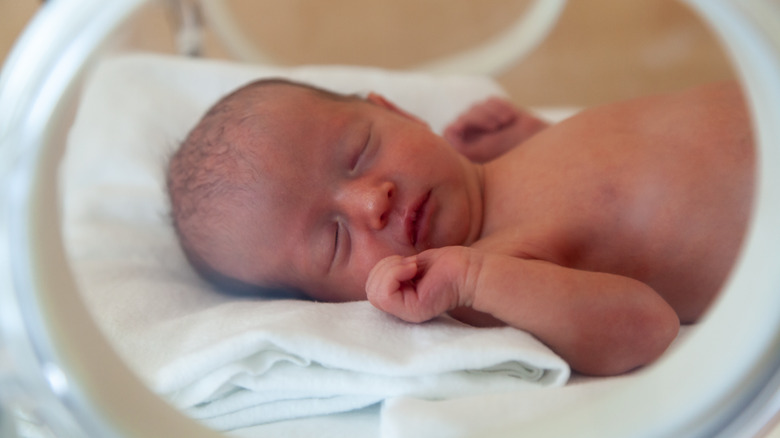The Number Of Preemies Being Born In The US Continues To Rise
Premature birth occurs when babies are born before 37 weeks of gestation. According to the Mayo Clinic, risk factors for premature birth include multiple pregnancies, IVF, having a previous premature birth, severe stress, medical problems with the uterus, cervix, or placenta, smoking cigarettes, substance use, and infections or health risks like high blood pressure or diabetes, and injury.
While most preemies tend to catch up to their developmental age, and become healthy children by the time they are three years old, some encounter longer recovery periods (via WebMD). Sadly, many premature babies spend time in the NICU, and a percentage of preemies face lifelong challenges as a result of being born too soon.
The CDC reports that the earlier a baby is born, the greater the risk of death or severe disability. Data from 2020 shows that preterm birth was responsible for 16% of infant deaths. A new report says that premature birth is undergoing an alarming trend in the U.S.
New report shows premature birth has increased in U.S.
The nonprofit group March of Dimes puts out an annual report card on the health of moms and babies across the U.S. It found that the rate of preterm birth in the U.S. increased to 10.5% in 2021, which is a D grade. Disturbingly, this shows a 4% jump since the previous year.
Dr. Zsakeba Henderson, interim chief medical and health officer at March of Dimes, says these numbers represent a 15-year high (via CNN). "There are too many babies being born too soon: 1 in 10," says Henderson. "If you were to have ten babies in front of you, and one of them is having to face the complications that come with prematurity, that's unacceptable, and we need to do better."
Vermont has the lowest preterm birth rate at 8%, earning an A. Places that received an F grade, with a premature birth rate between 11.9% and 13.5%, include Georgia, Oklahoma, Arkansas, Kentucky, South Carolina, West Virginia, Alabama, Louisiana, and Puerto Rico. Mississippi has the highest rate of all states, reaching 15%.
While COVID-19 has certainly played a role in recent numbers, there is more at play. "The United States is one of the worst places to give birth and be born among industrialized countries," says Henderson. "It's because of our disproportionate numbers of preterm births — particularly for populations that are disproportionately impacted, such as Black families and American Indian and Alaskan Native families — that our rates are so much higher than other countries."

